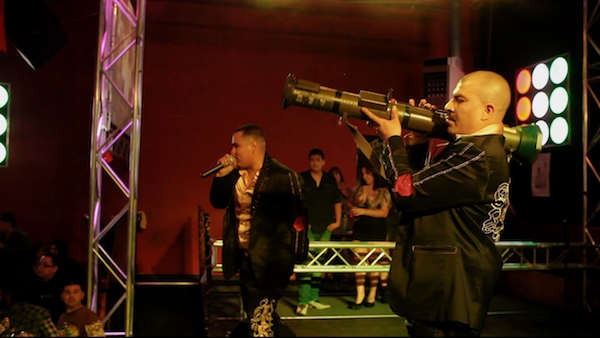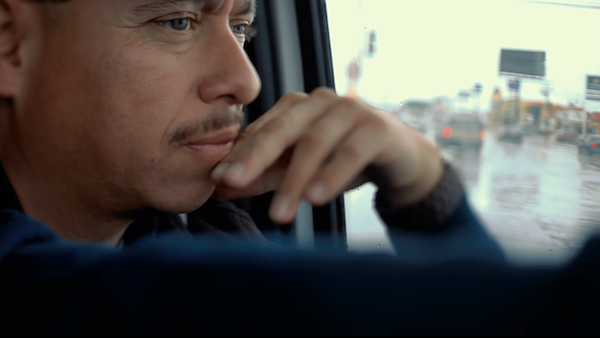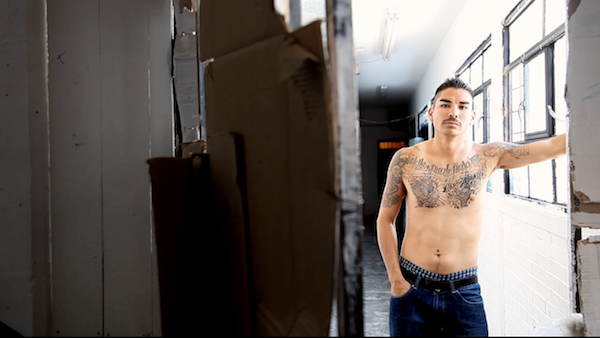| Reviews & Columns |
|
Reviews DVD TV on DVD Blu-ray 4K UHD International DVDs In Theaters Reviews by Studio Video Games Features Collector Series DVDs Easter Egg Database Interviews DVD Talk Radio Feature Articles Columns Anime Talk DVD Savant Horror DVDs The M.O.D. Squad Art House HD Talk Silent DVD
|
DVD Talk Forum |
|
|
| Resources |
|
DVD Price Search Customer Service #'s RCE Info Links |
|
Columns
|
|
|
Narco Cultura
The Movie:

With famed drug kingpin Joaquín "El Chapo" Guzmán Loera getting nabbed by authorities this past week, the Mexican drug war returns again to the front pages of U.S. newspapers. The new documentary by photojournalist Shaul Schwarz, Narco Cultura, paints a portrait of two men whose livelihoods are tied in utterly different ways to this ever-increasing tide of violence and bloodshed in Mexico.
First, we are introduced to crime scene investigator Richi Soto, a low-key sort of guy who continues to work in forensics in Juárez, Mexico, despite a number of his colleagues getting assassinated in the past few years. The investigators are shown frequently wearing ski masks as a precaution, in case cartel members are lingering at the crime scene to plot retribution. All of these assassinations take place either while the investigators are driving to work or driving back home. Schwarz records Richi driving home one night, and the investigator points out all the possible red flags of which he has to keep aware. A big black pick-up truck with no license plates stopped in front of his car gives him understandable pause.
Schwarz's other subject is narco corrido singer Edgar Quintero, of the band BuKnas de Culiacán. Neither Edgar nor his band is from the Mexican town of Culiacán -- they're actually from Los Angeles. However, Culiacán is the city where El Chapo based his drug empire, which therefore makes it seem like a pretty badass place. You see, the songs Edgar makes, narco corridos, feature lyrics that are sort of a blend of Johnny Cash murder ballads and hardcore gangster rap, with a more traditional Mexican musical setting featuring instruments like acoustic guitars, accordion, and sousaphone. The lyrics can be incredibly specific, not just in the description of violent acts but in describing the real-life individuals involved. Schwarz shows Edgar on the phone with a drug dealer, trying to get details from the dealer's life for a new batch of lyrics. Edgar then meets up with the dealer and sings him the new tribute song. The dealer approves, pays Edgar for writing a song about him, and presumably the band cuts the track for their next album. There becomes a weird cycle within the world of the narco corridos, where the drug cartel members are made to feel like mythic figures, because they are getting all these laudatory songs written about them, and then the singers feel like hot stuff because they get to buddy up to real live cartel members who are out there wreaking havoc.
The truly shocking thing about all of this, which the film makes uncomfortably clear, is that the music is not part of some weird marginal subculture. Narco corridos are mainstream pop culture in Mexico and Latino communities in the U.S. There's a pointed scene in which investigator Richi is at a party where a local narco corrido band is playing -- performing upbeat-sounding songs about being vicious murderers -- and Richi's only comment to one of the other guests is that he doesn't really like the singer's voice. The subject matter of the songs is such an ingrained part of the culture that it doesn't even faze him.
While following Edgar, Schwarz goes to a gangster film shoot. Edgar is acting in a supporting role. The set is mobbed with teenybopper-ish fans. Schwarz talks to some of the teenage fan girls. They gush over the narco lifestyle, and one of them expresses her aspirations to date a cartel member.
At first, it seems like Schwarz might be structuring his film around these two concurrent portraits of Richi and Edgar, to show how one man is dealing with the reality of all the killing and the other is busy making deluded fantasies about it. But the oddest thing is that the makers and fans of narco corridos are not deluded. They are well aware of the full extent of the brutality; in Mexico, they literally see it every day. Schwarz got access to multiple crime scenes, and there are many disturbing shots of mutilated bodies and weeping family members in the film. One of the most unnerving moments involves a shopkeeper sweeping a river of blood away from his business and into the sewer, while impassive onlookers stand nearby wearing Santa hats... because it's Christmas. The members of BuKnas de Culiacán fully understand what they are talking about too. They visit narco blogs, with uncensored photos and videos of assassinations, torture, and other random violence perpetrated by the cartels -- that's a big source of inspiration for their tributes.
Schwarz interviews a Juárez journalist who theorizes that narcos are held up as folk heroes because the corruption of the system causes people to feel powerless. The narco lifestyle, by bucking the system, represents what's missing for them. She says that, of the ten of thousands of drug war-related murders in Mexico in the past decade, only around three percent have been pursued fully by the criminal justice system. That statistic puts the importance of Richi's work into serious doubt. He feels like he is doing something necessary and dismisses naysayers who characterize the forensic teams as just "bullet collectors." But, as Schwarz tracks his camera past shelves overflowing with boxes of evidence that apparently will remain untouched, it's hard to believe that's really the case. Nonetheless, the film shows Richi as dedicated to preserving the good in Juárez and, despite numerous misfortunes over the course of the film, that possibility is not completely discounted.
Narco Cultura is a fascinating, well-crafted piece of work. Its examination of a nation's institutionalized acceptance of egregious widespread violence, and the odd desire to create art for the dedicated purpose of boasting about these vicious acts, makes the film a kindred spirit with Joshua Oppenheimer's The Act of Killing. Yet, unlike in that film, no one here seems to be reluctantly wrestling with his conscience. Maybe that makes Narco Cultura the slightly bleaker film, but, for the sake of people sharing Richi's situation, one must hold out hope for future change.

The Blu-ray
The Video:
Since director Shaul Schwarz's background is in photography, Narco Cultura often has a slightly stylized look. It is not excessively pretty, but it has definitely been shot with an eye toward artful compositions. There is a little bit of variability in the 1.77:1 1080p AVC-encoded image -- some of it from the differing quality of archive clips, some of it due to the vérité shooting conditions of the main footage, and some of it due to the encode. In regard to that last one, there are sporadic issues with noise and a few incidents of banding. Otherwise, the level of detail is excellent, and the colors are vivid and deeply saturated. Overall, it looks good.
The Audio:
The DTS-HD MA 5.1 audio is a blend of English and Spanish dialogue. The disc comes with the option to get English subtitles over the Spanish portions or Spanish subtitles over the English portions. Overall, this is a nice atmospheric track, with Jeremy Turner's moody musical score coming through the surround speakers. The field-recorded dialogue sounds A-OK up front.
Special Features:
- Deleted Scenes (HD, 10:41) - Seven scenes that can be played separately or together, including more time on the gangster movie set, a brief discussion with violence-loving drug users, and a look at an underground L.A. party. These moments are all worthwhile to check out. Most likely they were cut because they would have taken the focus too far away from the two main subjects.
- Trailer
Final Thoughts:
Narco Cultura is a completely engrossing, sometimes upsetting look at the current Mexican drug war and the bizarre culture-at-large that has been created in its wake. Highly Recommended.

Justin Remer is a frequent wearer of beards. His new album of experimental ambient music, Joyce, is available on Bandcamp, Spotify, Apple, and wherever else fine music is enjoyed. He directed a folk-rock documentary called Making Lovers & Dollars, which is now streaming. He also can found be found online reading short stories and rambling about pop music.
|
| Popular Reviews |
| Sponsored Links |
|
|
| Sponsored Links |
|
|
| Release List | Reviews | Shop | Newsletter | Forum | DVD Giveaways | Blu-Ray | Advertise |
|
Copyright 2024 DVDTalk.com All Rights Reserved. Legal Info, Privacy Policy, Terms of Use,
Manage Preferences,
Your Privacy Choices | |||||||














